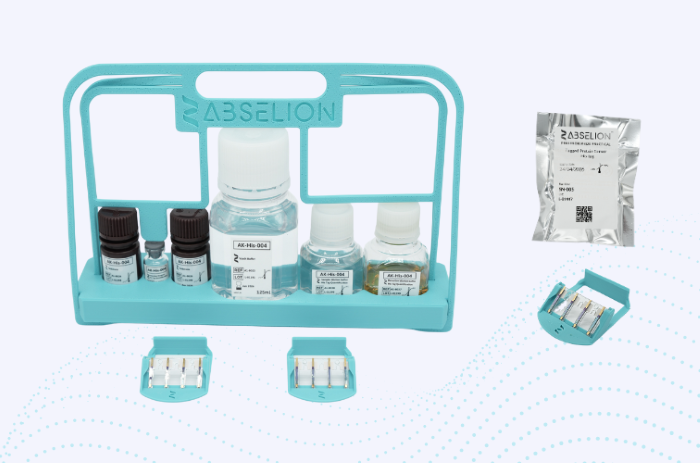Abselion, a pioneering life sciences technology company focused on simplifying biomolecule quantification, has expanded its Amperia™ assay portfolio with the launch of its Tagged Protein Quantification Kit | His-tag and Tagged Protein Sensor | His-tag Quantification.
The novel assay, developed with GenScript's THE™ His Tag Monoclonal Antibodies, provides researchers with a ready-to-use solution for rapid, reliable measurement of His-tagged proteins. This launch marks a significant milestone in extending Amperia, beyond antibody and AAV assays, into the wider field of recombinant protein analysis, enabling researchers to generate high-quality data more quickly and dependably across expression, optimization, and development workflows.
 Image Credit: Abselion
Image Credit: Abselion
His-tags are among the most widely used affinity tags, supporting purification and detection of recombinant proteins expressed in bacterial, insect, and mammalian systems. Quantification often involves ELISA, gels, or spectrophotometric methods, which can be time-consuming, variable, or less effective, particularly when working with crude samples. Abselion's Tagged Protein Quantification Kit provides a fast, reproducible, and ready-to-use alternative for drug discovery, structural biology, therapeutic research, and bioprocess development workflows.
Abselion's Amperia benchtop platform is a simple-to-use solution that uses redox electrochemical detection for rapid and accurate automated quantification of a range of biomolecules, without optics or fluidics. The new assay runs in a premix competition format, within Amperia's intuitive, software-controlled workflow, to quantify His-tagged proteins directly from crude or purified samples without specialist training.
Each kit includes pre-coated sensor strips, together with assay plates, detection reagents, and buffers in a complete, ready-to-use package. At the core of the new kit are electrochemical sensor strips pre-coated with GenScript's validated antibodies, immobilized on the sensor surface. These high affinity antibodies offer broad reactivity across common His-tag variants and expression systems for enhanced assay robustness. Incorporating these directly onto the strip reduces manual handling steps and the need for additional assay development or optimization, improving usability and supporting more consistent performance.
In parallel to the complete Tagged Protein Quantification Kit | His-tag for guided, automated workflows, Abselion has also launched the Tagged Protein Sensor | His-tag Quantification as a standalone consumable pack. This provides direct access to the antibody-coated sensor strips, offering additional flexibility for a wide range of His-tag assays on the Amperia platform.
The His-tag launch is one of the first affinity-based, electrochemical, automated kits for crude samples and marks an important step in extending Amperia into one of the most widely used areas of protein science.
By combining GenScript's trusted antibody technology with our ready-to-use design, we are giving researchers faster, more dependable ways to quantify His-tagged proteins directly from complex samples.
Together with the flexibility of a standalone sensor option, this reflects Abselion's mission to make high-quality protein quantification more practical and accessible to meet the needs of scientists across research, development and bioprocessing."
Dr Ruizhi Wang, CEO and Founder, Abselion
Higgins Qin, Senior Director, Protein & Antibody R&D, GenScript, added: "Our THE His Tag Monoclonal Antibodies are recognized for their high affinity and broad applicability across recombinant protein workflows. Incorporating these into Abselion's Amperia system provides researchers with a solution that simplifies His-tag quantification and supports consistent measurement from crude through to purified samples. We are pleased to see GenScript's trusted antibody technology applied in an innovative format that makes protein analysis more reliable and accessible."